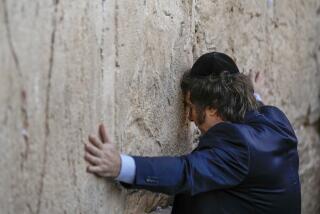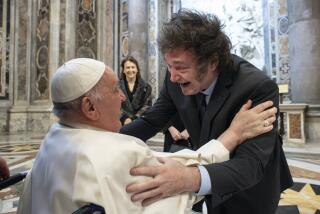Latin America ebullient over Argentine pope
SAO PAULO, Brazil — In Mexico, President Enrique Peña Nieto tweeted an affectionate greeting for Pope Francis as he prepared for a last-minute trip to arrive in Rome in time for Mass at the Vatican on Sunday.
Acting Venezuelan President Nicolas Maduro joked that Hugo Chavez, his predecessor who died last week, must have persuaded Jesus that the world was ready for a South American pope.
And in Brazil, many people confessed a tinge of disappointment that a Brazilian papal candidate had been bypassed for a cardinal from their rival — and fellow soccer-mad nation — Argentina.
“Ole! Argentine dribbles past Brazilian and becomes pope,” read the headline on a Brazilian sports daily.
Across Latin America, the news that a fellow Latin American had been selected pope drew thousands of faithful to cathedrals and churches to pray, to applaud and to give thanks that the region had finally achieved a measure of recognition as home to the largest number of Roman Catholics in the world.
And although reactions also revealed regional rivalries, from good-natured ribbing to grudging admiration for Argentina’s boosted world stature, the overall mood seemed to be one of hope and tremendous pride that the new pope would bring more attention to Latin America and its people.
“I think it’s great news,” said Juan Jose Montesinos, 42, a businessman interviewed at the Mexico City Metropolitan Cathedral. “We always talk about the pope, and the Vatican, as if they’re distant ... so I hope that this pope gets closer to us. ... Pope Benedict gave the impression that he was never much interested in Latin Americans.”
“Of course I would have liked a Brazilian to win. Who wouldn’t?” said Silviane Aparecida de Paula, 53, interviewed at the Sao Paulo Cathedral. Brazil’s Cardinal Odilo Scherer had been considered a favorite. “But when I saw the news, I was really, deeply, happy,” she said. “This is our first Latin American pope. It’s such an important moment.”
Many people said Pope Francis could promote efforts to reverse the diminished stature of Catholicism in some parts of South America. Bruno Bazi, a 19-year-old student, said having an Argentine in the papacy could help the Brazilian church as it continues to lose worshipers to powerful evangelical movements.
“Of course this could bring more of the faithful back,” said Bazi, who said he hadn’t been going to Mass nearly as much as he thinks he should. “This is a man who is going to just be closer to us in every way.”
Francis’ reputation for being a man of the people also brought hope.
“I couldn’t care less what country he is from,” said Jassie Orellana, a 60-year old Brazilian nurse who left the church for evangelicalism. “What matters for me is it seems he will pay more attention to the poor and needy, based on the way he’s lived his life so far.”
Some people questioned whether Francis was truly a Latin American pope, highlighting perceptions of Argentina as a nation different from many other Latin American countries, with its large European immigrant population.
“I don’t see him as a Latin pope,” said Mexican college student Maria Flores, 21. “Argentines say they are Europeans, and they really believe they are Europeans. Let’s give it some time before this pope actually shows he’s interested in the countries of Latin America.”
But for all the talk of rivalry among countries — Folha de Sao Paulo, Brazil’s largest newspaper, ran a column headlined “Argentina 1, Brazil 0” — the conversation has stayed almost entirely friendly.
Bevins reported from Sao Paulo, Sanchez from Mexico City and Marosi from San Diego.
More to Read
Sign up for Essential California
The most important California stories and recommendations in your inbox every morning.
You may occasionally receive promotional content from the Los Angeles Times.











